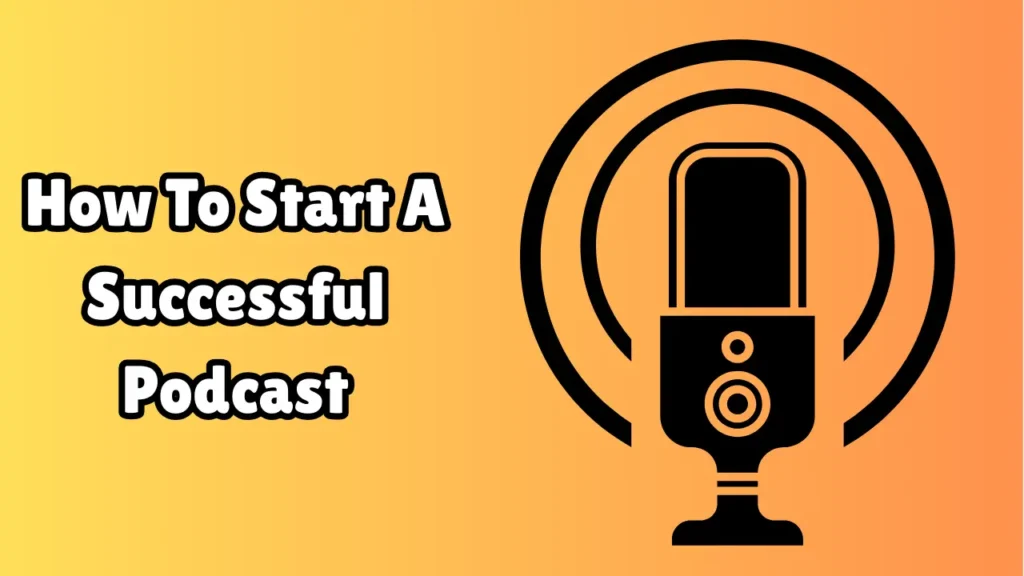How to Start a Successful Podcast
Podcasting has exploded in popularity over the last decade, offering creators a powerful platform to share stories, educate audiences, and build communities. Whether you’re looking to promote your brand, grow an audience, or just have meaningful conversations, podcasting can be an excellent medium — but success doesn’t happen by accident. It takes strategy, consistency, and passion.

In this guide, we’ll walk you through how to start a successful podcast step-by-step — from idea to launch to growth.
Define Your Podcast Concept
Before you record anything, you need to get crystal clear on what your podcast is about. The clearer your concept, the easier it will be to attract the right audience.
Ask yourself:
-
What topic or niche will I focus on?
-
Who is my target audience?
-
What makes my podcast unique?
-
What’s the goal — education, entertainment, marketing, or something else?
Examples:
-
A podcast about entrepreneurship for freelancers.
-
A show exploring true crime stories with forensic experts.
-
A light-hearted pop culture commentary podcast for Gen Z listeners.
Pro Tip: Choose a topic you’re passionate about and could talk about endlessly — podcasting requires long-term commitment.
Choose a Podcast Format
The format defines the structure of your episodes and helps maintain consistency.
Common formats:
-
Interview-style – Host interviews guests.
-
Solo/monologue – You speak directly to the audience.
-
Co-hosted – Two or more hosts share insights.
-
Storytelling – Narrative-driven, often used in true crime or fiction.
-
Panel – A group discusses a topic, often in a roundtable format.
Decide on episode length too. Common durations range from 15 minutes to an hour, depending on content.
Plan Your Episodes
You don’t need to script every word, but planning helps maintain focus and flow.
Create:
-
An episode outline or talking points.
-
A backlog of 3-5 episodes before launch.
-
A catchy intro and outro with music (royalty-free or licensed).
Having a few episodes ready gives your audience something to binge — increasing the chance of engagement and subscriptions.
Set Up Your Equipment
You don’t need a pro studio, but good audio quality is essential. Here’s what you’ll need:
Basic Podcast Equipment:
-
Microphone – A USB mic like the Blue Yeti or XLR mics like the Shure SM7B (advanced).
-
Headphones – To monitor audio without feedback.
-
Pop filter – Reduces harsh “P” and “S” sounds.
-
Mic stand or boom arm – For stability.
-
Recording software – Audacity (free), GarageBand (Mac), or Adobe Audition.
For interviews, tools like Zoom, Riverside.fm, or Zencastr work well for remote guests.
Record and Edit Your Episodes
When recording:
-
Choose a quiet space with minimal echo.
-
Use headphones to avoid echo/feedback.
-
Test levels before recording a full episode.
Editing Tips:
-
Remove long pauses, filler words, and background noise.
-
Add intro/outro music and transitions.
-
Keep it natural — over-editing can sound robotic.
Editing software:
-
Audacity (free and beginner-friendly)
-
Descript (transcription + editing)
-
Adobe Audition (professional)
If editing feels overwhelming, you can outsource it to a freelancer.
Design Your Branding
Branding helps you stand out and builds recognition.
Essentials:
-
Podcast Name: Short, memorable, and reflects the content.
-
Cover Art: A 3000×3000 pixel image (required by platforms).
-
Show Description: Write a compelling description with relevant keywords for SEO.
-
Episode Titles: Make them clear and clickable.
You can create artwork using tools like Canva, Fiverr, or hire a designer for a professional look.
Choose a Podcast Hosting Platform
You need a podcast hosting provider to store your audio files and distribute them to podcast directories.
Popular podcast hosts:
-
Buzzsprout
-
Podbean
-
Anchor (Spotify for Podcasters)
-
Libsyn
-
RSS.com
These platforms will generate your RSS feed, which you’ll submit to directories like:
-
Apple Podcasts
-
Spotify
-
Google Podcasts
-
Amazon Music
-
Stitcher
Tip: Fill in metadata like show categories, keywords, and tags — this improves discoverability.
Launch Your Podcast
A strong launch can help you get early momentum.
Tips for a successful launch:
-
Release 3-5 episodes on day one.
-
Promote on all your platforms (social media, email list, website).
-
Ask listeners to subscribe, rate, and review — especially on Apple Podcasts.
-
Join podcast communities (Facebook Groups, Reddit, etc.).
-
Collaborate with other podcasters in your niche.
You can even run a small ad campaign or giveaway to boost visibility.
Promote and Grow Your Audience
Now that your podcast is live, the real work begins: promotion and consistency.
Promotion Strategies:
-
Share episode clips or audiograms on social media (use Headliner or Wavve).
-
Convert episodes into blog posts for SEO.
-
Submit to podcast directories and aggregators.
-
Encourage guest sharing (if doing interviews).
-
Cross-promote on other podcasts.
-
Appear as a guest on other shows.
Stick to a regular publishing schedule — weekly or bi-weekly works best for most audiences.
Monetize Your Podcast (Optional)
Once you’ve built a loyal audience, you can explore ways to monetize.
Common monetization options:
-
Sponsorships and ads (via platforms like Podcorn or Spotify)
-
Affiliate marketing
-
Merchandise
-
Crowdfunding (Patreon, Buy Me a Coffee)
-
Premium content or private episodes
Make sure monetization doesn’t negatively impact the listening experience.
Conclusion
Starting a successful podcast requires more than just talking into a microphone — it’s about planning, connecting with an audience, and consistently delivering value. From choosing the right topic to promoting your episodes, each step plays a role in your success.
Remember, great podcasts don’t happen overnight. The key is to stay consistent, keep improving, and genuinely enjoy the process. Whether you reach a hundred or a hundred thousand listeners, podcasting can be an incredibly rewarding experience.